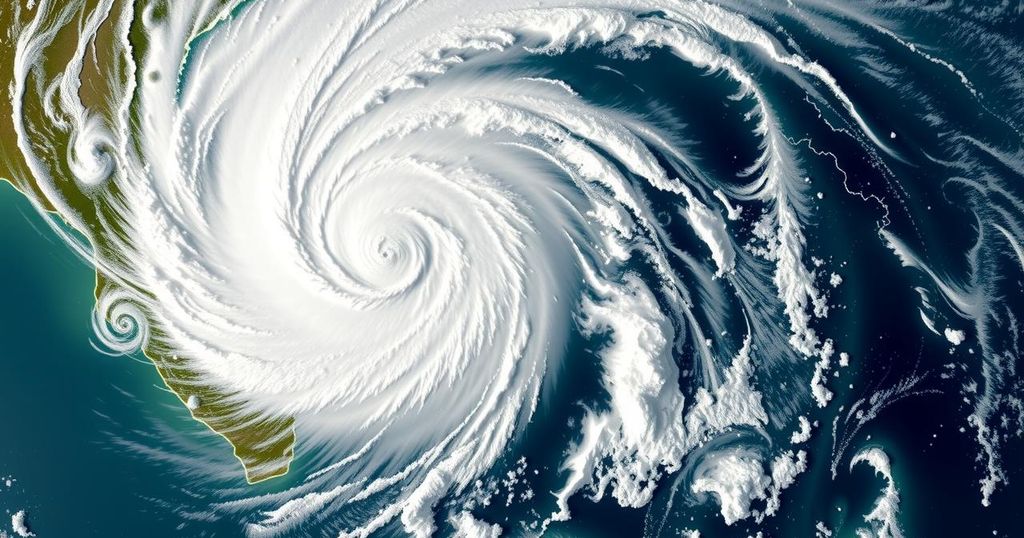World news
AFRICA, BRUNO RETAILLEAU, CHI, CNN, EMERGENCY RESPONSE, EMMANUEL MACRON, EUROPE, FRANCE, FRANCOIS BAYROU, FRANCOIS DUROVRAY, FRENCH INTERIOR MINISTRY, INDIAN OCEAN, INTERIOR MINISTRY, MAYOTTE, MOZAMBIQUE, NATURAL DISASTER, NATURAL DISASTERS, OLYMPIC GAMES SECURITY, PARIS, REUNION, WEATHER SERVICE
Daniel O'Connor
0 Comments
Cyclone Chido Devastates Mayotte, Threatens Eastern Africa
Cyclone Chido has devastated Mayotte, causing fatalities and extensive property damage as it heads toward Africa. The storm’s winds reached over 220 kph, leading to significant destruction of public infrastructure. Authorities are responding with emergency measures amid fears of a high death toll. The cyclone could severely impact Mozambique, with potential flooding expected in Malawi and Zimbabwe.
Cyclone Chido has wreaked havoc on the French territory of Mayotte, resulting in multiple fatalities as it progresses toward the eastern coastline of Africa. French Interior Minister Bruno Retailleau reported an initial assessment indicating several casualties, although exact numbers remain unconfirmed due to ongoing rescue operations. “We’re afraid the toll will be high, but for the moment, I can’t give any figures,” he stated, emphasizing the dire situation on the island, which has a population exceeding 300,000 and is located approximately 800 kilometers off the coast of Mozambique.
The cyclone, characterized by winds exceeding 220 kph (136 mph), caused significant destruction, including damages to public infrastructures such as the prefecture, hospital, and airport, according to Prime Minister François Bayrou. The local government reported that residents of informal settlements faced heightened risks during the storm’s onslaught. President Emmanuel Macron is actively monitoring the effects of the cyclone, which has been described as the most severe since 1934 by Mayotte prefect François-Xavier Bieuville. In response, authorities have deployed 1,600 police and gendarmerie personnel to assist the population and prevent potential incidences of looting.
Despite restoration efforts, Mayotte’s airport has sustained substantial damage, particularly to its control tower, indicating a lengthy recovery process ahead for the region. As the situation remains precarious with thousands reportedly without power and numerous homes destroyed, citizens have been urged to stay in robust shelters. The nation of Comoros, north of Mayotte, has also experienced intense weather conditions from Cyclone Chido, prompting closure of government facilities and the airport.
As Cyclone Chido moves toward Mozambique, forecasts indicate that the cyclone may have severe impacts on the northern provinces, potentially affecting 2.5 million individuals. Landlocked nations, Malawi and Zimbabwe, are bracing for flooding and potential evacuations as a safety measure. This cyclone season has already experienced a series of impactful disturbances, with past storms like Cyclone Idai and Cyclone Freddy leaving extensive fatalities and humanitarian crises in their wake. Experts assert that the intensity of such cyclones is escalating due to climate change, which disproportionately impacts poorer nations despite their minimal contributions to global climate change.
The phenomenon of cyclones poses a significant threat to regions in the southeastern Indian Ocean and southern Africa, particularly during the defined cyclone season from December to March. Mayotte and its neighboring islands have been historically vulnerable due to their geographical positioning, and recent years have observed an alarming increase in cyclone intensity, attributed to the effects of climate change. This has resulted in severe humanitarian crises in already impoverished nations, highlighting the urgent need for climate resilience initiatives.
In summary, Cyclone Chido has resulted in substantial loss and destruction in Mayotte, prompting urgent humanitarian responses while threatening additional nations as it advances toward Africa. The storm’s aftermath underscores the worsening impact of climate change on cyclone severity and the resultant humanitarian crises, amplifying the need for comprehensive disaster preparedness and international support.
Original Source: www.cnn.com




Post Comment